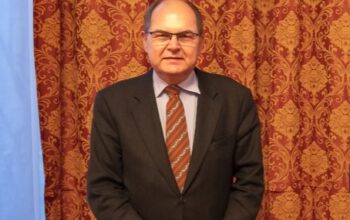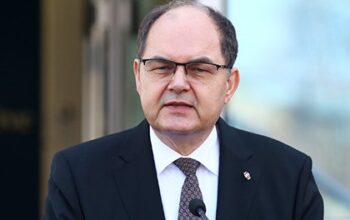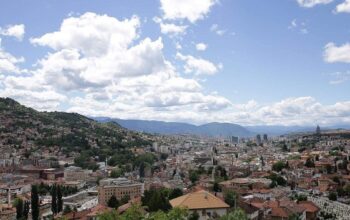Western media, in its coverage of BiH’s elections, has missed the two most destabilizing results.
First, violating foundational principles of the BiH Constitution and the Dayton Peace Accords, Bosniaks manipulated the presidential elections to place a supporter of the Bosniak political agenda in the Croat seat of the three-member Presidency. The Croat candidate overwhelmingly supported by BiH citizens of Croat ethnicity was blocked.
Second, the man elected to be the Bosniak member of the Presidency has been very publicly and credibly linked to horrific war crimes committed against Serbs by the El Mujahid Detachment during the 1990s civil war. Croat citizens feel disenfranchised because they did not elect the Croat member of the BiH presidency and Serb citizens feel threatened by the Bosniak choice of a Presidency member seen to be a war criminal guilty of encouraging foreign jihadist fighters in their murder and torture of Serbs during the war. By electing these two members of the Presidency, Bosniaks have gravely threatened the delicate balance among the country’s Serb, Bosniak and Croat populations mandated by the Dayton Peace Accords and the BiH Constitution.
Instead of paying attention to these destabilizing results, the western media has largely focused on the supposed threat to inter-ethnic relations and BiH’s integrity presented by the election of Republika Srpska (RS) President Milorad Dodik to be the Serb member of the BiH Presidency.
Yet Dodik’s party has held the BiH Presidency for eight out of the past twelve years without instability or a breakdown in inter-ethnic relations. During and since the campaign, Dodik laid out his agenda for his term in the BiH Presidency. It includes advancing RS interests and RS rights under the BiH Constitution as well as removing the Office of the High Representative (OHR), which continues to claim—without any legal basis—a right to rule BiH by decree. Dodik’s agenda does not include any measures to worsen ethnic relations or dismantle BiH. A more careful analysis of Dodik’s election reveals why it should be seen as a step forward for BiH. As former OHR attorney Matthew Parish wrote this week, “Dodik’s participation in the multi-ethnic Bosnian central government, as easily the most popular Bosnian Serb politician, is a remarkable advance.”
While western media has dwelled on the supposed damage to BiH from Dodik’s victory, it has disregarded the worrisome implications of the election of the Croat and Bosniak members of the Presidency.
Election of Željko Komšić
The victor in the election for the Croat seat in the Presidency was not elected by Croats, but instead by Bosniaks. One of the BiH Constitution’s key elements designed to ensure inter-ethnic peace is its establishment of a three-member Presidency to provide representation to Bosniaks, Serbs, and Croats. This provision was intended to protect each of the Constituent Peoples against violation of its interests by one or both of the other peoples.
However, in the 2006 and 2010 elections, Bosniak political parties ran roughshod over this principle by encouraging Bosniak voters to vote for an ethnic Croat, opposed by the major Croat parties. Because Bosniaks are much more populous than Croats in the Federation, Bosniak voters were able to elect not just the Bosniak member of the Presidency, but also Željko Komšić, a nominally Croat politician with little support among Croats.
In the months leading up to this year’s election, Croat and Serb political leaders in BiH warned Bosniak political leaders not to attempt to disenfranchise the Croat people again. The Head of BiH’s Islamic Community, Grand Mufti Husein Kavazović, also wisely said it would not be good if one people elected another people’s representative.
Unfortunately, in this year’s election, Bosniak politicians ignored these warnings and again encouraged Bosniak voters to vote for Komšić. Bosniak voters were thus able to elect not just the Bosniak member of the Presidency, Šefik Džaferović, but also, Komšić once again. It is regrettable that the warnings against disenfranchising Croats were not heeded.
As former High Representative Miroslav Lajčák observed after the election, as a result of Komšić’s election, the “Croats feel that they are not represented,” Lajčák explained, “The Croat member of the presidency was elected by Bosniaks and, for [Croats] they have always felt marginalized, and now they will feel even more so. For them, it is two Bosniaks and one Serbian, but no Croat, in the presidency.”
Legal reforms must be enacted to ensure that in future elections, Croats, like the other Constituent Peoples, are able to choose a member of the Presidency to represent them. For now, though, the fact that Croats have been denied a representative in the BiH Presidency presents BiH with a political crisis.
Dragan Čović, the current Croat member of the BiH Presidency and head of the largest Croat party, said after the election that no BiH Council of Ministers or Federation Government will be formed without changes to the BiH Election Law. After a meeting with Čović, Croatia’s president and prime minister said in a statement that amending the Election Law in order to guarantee that Croats can elect their own representative is important to democratic stability.
Election of Šefik Džaferović
In a result that is highly disturbing to Serbs in BiH, the election for Bosniak member of the BiH Presidency was won by Šefik Džaferović, a man who has been credibly linked to horrific war crimes committed against Serbs by the El Mujahid Detachment. The El Mujahid, which was made up largely of foreign jihadists, routinely tortured and beheaded Serb prisoners during the war in BiH. During that period, Džaferović was head of SSC Zenica, the Criminal Police Department for State Security in Zenica, which was the El Mujahid’s headquarters. Evidence provided by former Federation Vice President and former SDA member Mirsad Kebo indicates that Džaferović was complicit in wartime atrocities committed by the El Mujahid.
The evidence submitted by Kebo, for example, indicates that Džaferović stood just ten meters away when El Mujahid members beheaded a Serb civilian in Vozuća. Documents show that SSC Zenica, the agency Džaferović ran, was charged with monitoring the activities of the El Mujahid in the area. Džaferović was thus well informed about the El Mujahid’s war crimes in the area of his police responsibility but, instead of stopping them, aided El Mujahid members. One SSC intelligence report noted “a large number of applications for [BiH] citizenship” by members of the El Mujahid and said, “authorities are concerned that they are using BiH citizenship to hide their true identities . . . .” Yet documentary evidence shows that Džaferović wrote letters on behalf of El Mujahid members requesting that they be given BiH citizenship.
It is not hard to imagine the outrage that would result among Bosniaks and the western media if a leading Serb political party nominated someone who had credible links to war crimes against the Bosniaks, let alone if that candidate were elected. Yet there has been virtually no media analysis of the implications of Džaferović’s election to the BiH Presidency.
The western media should dig deeper and examine the violence done to the Dayton Constitution’s inter-ethnic accommodation among Serbs, Croats and Bosniaks by the disenfranchisement of Croats and election of a person widely seen as a war criminal.


